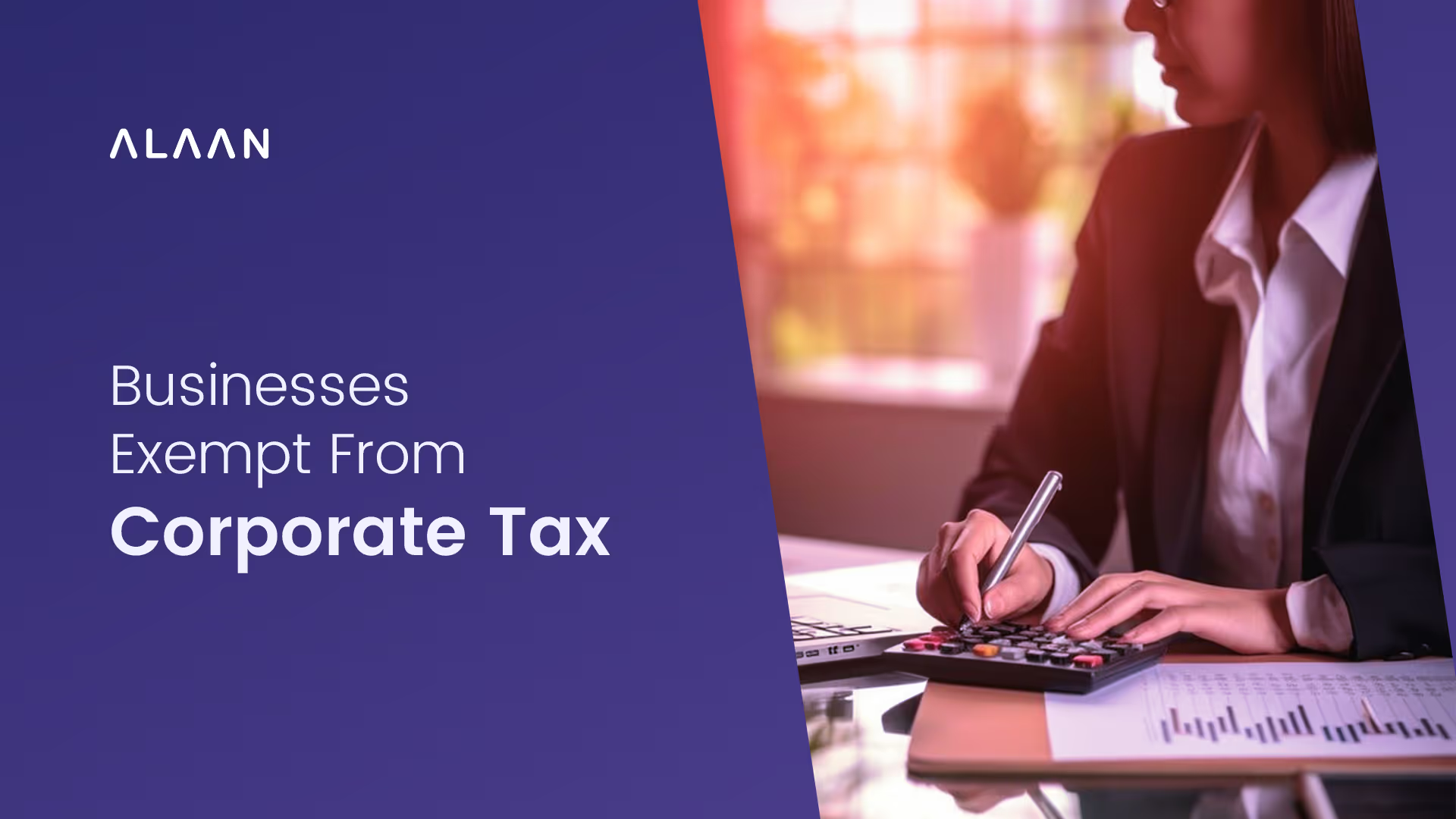Owing to robust infrastructure, strategic location, and business-friendly policies, the United Arab Emirates (UAE) attracts businesses from around the world, contributing to its status as a global hub for commerce and innovation in the Middle East. The UAE government has undertaken different measures over the years to optimize the country's business environment as per international best practices.
The introduction of the new Corporate Tax (CT) regime in June 2023 is one such step towards transforming the UAE economy. It is a form of direct tax that aims to reduce the UAE’s dependency on energy revenue and ensure transparency in the taxation framework. This law levies a 9% tax on taxable profits of corporations exceeding AED 375,000, whereas to support small enterprises, business profits below this threshold stand exempt.
It is crucial to note that not all businesses are subject to this tax. For instance, several entities are exempt from the corporate tax including investment funds, public benefit entities, private pensions, public pension and social security funds, and various others.
Your company can avail UAE corporate tax exemption if it meets the conditions specified under the law. Understanding these provisions is important, as it can have a direct impact on your enterprise's financial planning and decision-making processes. Let’s get started.

Entities that Qualify For UAE Corporate Tax Exemption
Before learning about the entities that qualify for UAE corporate tax exemption, it is important to discuss Article 4 and Article 51 of the Corporate Tax Law. While Article 4 mentions the persons who are exempt from the corporate tax in the country, Article 51 makes it compulsory for any taxable person to register with the Federal Tax Authority (with certain exceptions).
Through the Ministerial Decision No. 43 of 2023, the Ministry of Finance clarified the exceptions to Article 51. This order offers specific guidelines on the registration exemptions available under the law. The following entities are not required to register with the Federal Tax Authority as per the current UAE CT regime:
- A Government Entity
- A Government-controlled Entity
- A Person engaged in an Extractive Business that meets the conditions of Article 7 of the Corporate Tax Law
- A Person engaged in a Non-Extractive Natural Resource Business that meets the conditions of Article 8 of the Corporate Tax Law
- A Non-Resident Person that derives only State Sourced Income under Article 13 of the Corporate Tax Law and that does not have a Permanent Establishment in the State according to the provisions of the Corporate Tax Law
These exemptions are not applicable if the entities listed above become a ‘Taxable Person’ as per the rules specified in the law.
Now, let’s look into the specifics of organizations that are exempt from the UAE Corporate Tax based on guidelines mentioned in the law.
Business earning less than AED 375,000 in taxable income
According to the UAE corporate tax law, small businesses earning up to AED 375,000 in taxable income are not subject to the 9% corporate tax. This means that the tax rate, as per the rules, is effectively 0%. This exemption is part of the UAE government’s commitment to supporting small enterprises and creating a suitable environment for their growth.
However, if your taxable income is more than AED 375,000, the profits above this threshold will be taxable at 9%.

This means that you will have to pay a 9% tax on the amount unless your business qualifies for other exemptions under the UAE corporate tax exemption rules. This progressive tax structure aims to ensure that larger and more profitable businesses contribute to the national revenue.
It is pertinent to mention here that if a 'Free Zone' entity meets the conditions to be considered a 'Qualifying Free Zone Person', it will also be eligible for a 0% UAE CT rate on its qualifying income.

UAE Government and Government-Controlled Entities
Certain government entities and government-controlled entities are eligible for UAE corporate tax exemption. These entities include the UAE federal and local governments, as well as their departments, agencies, ministries, authorities, and public institutions. Let’s have a look at some important provisions of the law here:
- The tax exemption is applicable only if these entities are not conducting any business activity under a license issued by a suitable licensing authority like the Department of Economic Development or the Central Bank of UAE, depending on the nature of the business.
- Any such business activity is considered an independent business, and the law requires the entity to maintain the financial statements for such transactions separately.
- Any transactions related to the business activity mentioned above and other activities carried out by the entity will be regarded as related party transactions.
- A government entity can request the authority to consider all its commercial activities collectively as one ‘Taxable Person’ if they meet the rules established by the Minister.
This exemption policy is designed to support the operations of government and government-controlled entities. It allows them to focus on their mandated activities without the additional financial burden of the corporate tax.
Businesses Engaged in Natural Resource Extraction
As per the rules, businesses involved in the extraction of natural resources can avail of UAE corporate tax exemption. Instead, they continue to be subject to Emirates-level corporate tax. This exemption applies to businesses that meet specific conditions as outlined in the Federal Decree-Law No. 47 of 2022.
- To qualify for this UAE corporate tax exemption, a business must directly or indirectly hold or have an interest in a right, concession, or license issued by a Local Government to undertake its Extractive Business.
- The business must be effectively subject to tax under the applicable legislation of an Emirate.
- The business also needs to notify the Ministry in the form and manner agreed with the Local Government.
There might be situations when a business that meets these conditions derives income from both an extractive business and any other business defined in the corporate tax law. In that case, the net income from the extractive business shall be calculated and taxed according to the applicable legislation of the Emirate. This means that tax levied by the government of Abu Dhabi on such business activities during a calendar year might vary from those levied by the government of Dubai. The income earned from the other business will fall under the standard corporate tax regulations as per the following rules:
- Non-extractive business activities are treated separately for tax purposes. Proper financial records must be maintained for each type of business activity. The only exceptions to this rule are that such non-extractive business activities are incidental and are below 5% of the total revenue.
- Shared costs between the extractive and non-extractive activities need to be appropriately allocated based on the revenue from each segment within the tax period.
- Interactions between the different business divisions of the same entity are subject to related party transaction rules. They must adhere to the arm's length principle per the corporate tax law.

Non-Extractive Natural Resource Businesses
To qualify for UAE corporate tax exemption, a non-extractive natural resource business must meet several conditions as outlined in the Federal Decree-Law No. 47 of 2022.
- The business must either directly or indirectly hold an interest in a right, concession, or license. A local government must issue this authorization and must allow the business to conduct its non-extractive natural resource operations within the UAE.
- The qualifying income from non-extractive natural resource businesses must be derived solely from persons who undertake a business or business activity.
- The company must be subject to taxation under the applicable legislation of an Emirate.
- The enterprise must have notified the Ministry in the manner suggested by the local government.
When such a UAE business also generates income from other activities that fall under the scope of the Corporate Taxation (CT) law, the following additional rules are applicable:
- Revenue from the non-extractive business is taxed according to the Emirate-specific legislation.
- Profit of corporations from any additional business activities is governed by the Federal Decree-Law No. 47 of 2022 unless these activities also qualify for UAE corporate tax exemption.
- Ancillary or incidental operations that do not contribute more than 5% of total revenue are not regarded as distinct taxable entities. However, separate financial reporting is mandatory for different business segments. This will be based on an accurate allocation of shared costs as per their respective revenues.
- Transactions between the non-extractive business and any other division under the same ownership are viewed as related party transactions. They must adhere to the arm's length principle per the UAE law.
Qualifying Public Benefit Entities
Public benefit entities play a crucial role in the UAE by providing services in areas such as education, healthcare, and charity. In view of their social importance, the government has made them eligible for UAE corporate tax exemption. Under Article 9 of the UAE Corporate Tax Law, a qualifying public benefit entity can enjoy exempt income if it meets all the following conditions:
- It must be created and run exclusively for purposes like charitable, religious, cultural, athletic, healthcare, educational, or other purposes specified in CT law. The definition can also include chambers of commerce or professional entities operated exclusively for public benefit.
- It must not conduct any business activity other than those activities that are directly related to the purpose for which it was created.
- The earnings or assets must only be used for the creation of the entity or for paying any essential and reasonable expenses.
- No part of the income or assets should be made available for the personal benefit of any shareholder, trustee, founder, member, or settlor. The exceptions to this rule are qualifying public benefit entities, government, or government-controlled entities.
- Such entities must always maintain updated records to ensure continued compliance with the specified conditions. These records may be required by the authorities at any time during the financial year.
Qualifying Investment Funds
As per Article 10 of the UAE Corporate Tax law and Cabinet Decision No (81) of 2023, investment funds can seek tax relief from the Federal Corporate Tax if they meet all the following conditions:
- The fund or its manager must be under the regulatory supervision of an authority in the UAE or a recognized foreign authority. This ensures that the fund operates within a regulatory framework that protects investor interests.
- Interests in the fund must be traded on a recognized stock exchange. Otherwise, they should be sufficiently marketed and made available to a wide range of investors. This allows a diverse group of investors to participate in the fund’s activities.
- The fund’s primary purpose must not be to evade Corporate Tax. This is a critical condition to ensure that the operations are conducted with integrity and do not affect the spirit of UAE tax laws.
- Any other conditions that the UAE government may periodically specify.
Small Business Relief Initiatives
To create a supportive environment for small businesses, the UAE government has introduced the ‘small business relief’ initiative. This move is aimed at reducing the financial burden on small businesses and enabling them to reinvest their earnings into business growth. Under this scheme, businesses and individuals are exempt from corporate tax based on the following guidelines:
- Businesses and individuals with annual revenues below AED 3 million are eligible.
- The business must be a resident.
- The relief is not available to QFZPs or members of Multinational Enterprises Groups (MNE Groups) as defined in Cabinet Decision No. 44 of 2020. MNE Groups are groups of companies with operations in more than one country and have consolidated group revenues of more than AED 3.15 billion.
- The revenue threshold applies to tax periods starting on or after 1 June 2023. It will continue to apply to tax periods that end before or on 31 December 2026.
While this exemption provides significant relief, small businesses need to ensure a clear understanding of their financial operations. Even if your enterprise is currently exempt from the UAE corporate tax, keeping track of your business expenses is crucial. Real-time visibility into company expenses can help identify potential cash leakages, take timely corrective action, and create accurate budgets for future development plans.
Implementing Alaan's corporate card and spend management solutions can help optimize your business financials. With Alaan, you can:
- Monitor your expenses in real-time, ensuring all tax-deductible expenses are recorded.
- Minimize human errors in expense reporting and save time in tax filing.
- Ensure expense policy compliance throughout the company.
- Get valuable insights into the company’s spending patterns so that you can take strategic measures to control costs.
In the ever-evolving business landscape, staying ahead of the curve is key. With Alaan’s corporate card and spend management solutions, you can ensure your business is equipped to navigate the challenges of financial management.
If you are interested in learning more about how Alaan’s corporate card and spend management solutions can benefit your business, get in touch with the team.


.avif)







